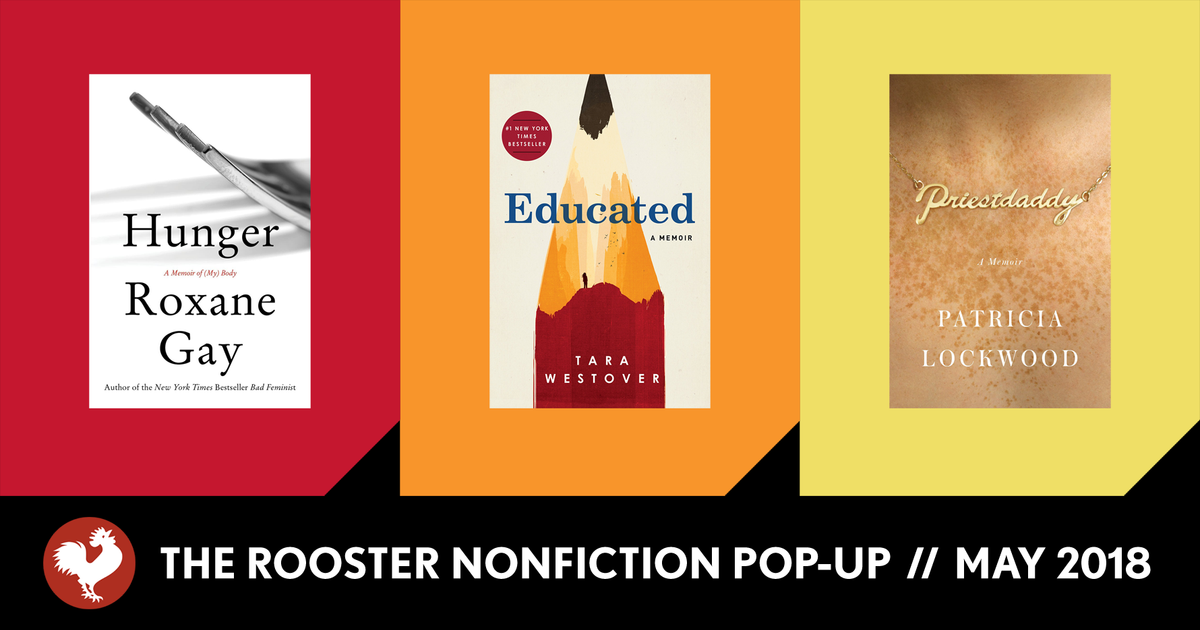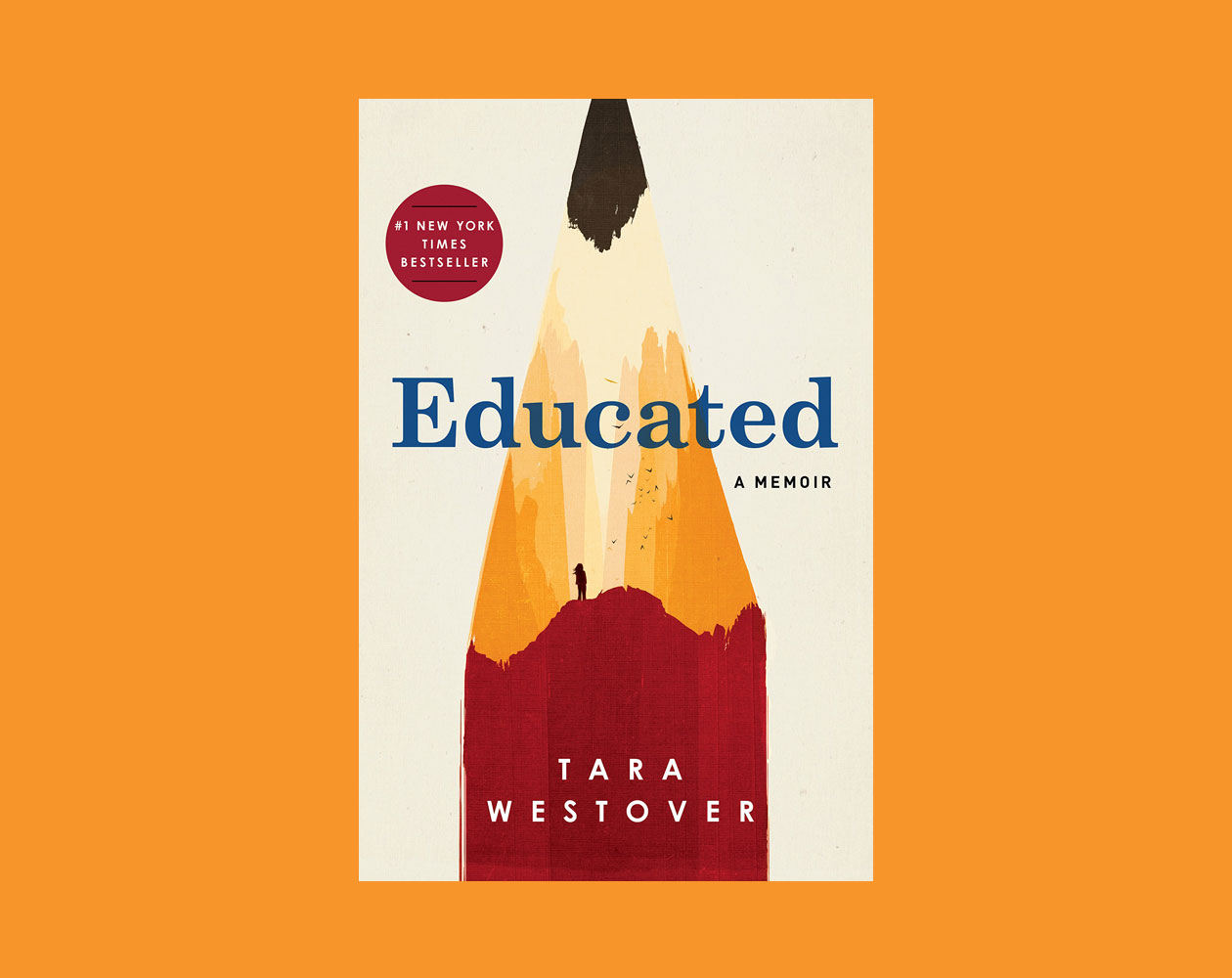The Rooster Nonfiction Pop-up: Educated, Second Half
Our first-ever Tournament of Books nonfiction event continues. Today TMN's Rosecrans Baldwin and Sarah Hepola discuss the conclusion to Tara Westover's harrowing, inspiring Educated.

Welcome to our first-ever Rooster Nonfiction Pop-up, brought to you by the organizers of the Tournament of Books.
All month long we’ll be discussing three recent works of nonfiction. To choose which books we’re reading this month, we asked this year’s ToB readers for suggestions back in March. We narrowed that list down to a single genre—memoir—and our readers voted to decide which three books we’d read for this event, and here they are: Hunger by Roxane Gay, Educated by Tara Westover, and Priestdaddy by Patricia Lockwood. You can see the full list of nonfiction contenders here.
Unlike the Tournament of Books and the Rooster Summer Reading Challenge, the Rooster Nonfiction Pop-up isn’t a competition—only a discussion about these three memoirs. Every Tuesday and Friday in May we’ll meet up to talk, and we’ll be teaming up with Sarah Hepola, author of the New York Times bestselling memoir Blackout: Remembering the Things I Drank to Forget. Grab some books and join in the fun!
- See the May 2018 nonfiction reading schedule
- Catch up on previous chats: Hunger (first half) (second half); Educated (first half)
- Jump into today’s discussion in the comments
Please note: We receive a cut from purchases made through the book links in this article.
Andrew Womack: Welcome back everyone to the second half of our discussion of Educated. By this point we’ve all read the entire book, including our discussion hosts, Rosecrans and Sarah. So here come the spoilers: Our narrator gets educated to the point of doctorship, but loses ties to most of her family along the way. Am I missing anything? Take it away, you guys.
Rosecrans Baldwin: Sarah, one of the first things I do when I finish a memoir and put the book down, I wonder, how true was all of that? This came up a couple times in the comments last week, like when we discovered Tyler Westover’s occasionally patronizing Amazon review (do a find on that page for “I am Tyler Westover”).
Some elements in the book have been misinterpreted from the way that Tara likely intended, and I think that some things Tara misunderstood herself. Because education is a primary theme of the book, I will offer a different perspective on that topic here. In writing this alternate perspective, I do not intend to convey that Tara’s interpretation of events is wholly in error. Our parents are extremists, and they and other members of our family have done terrible things that have hurt Tara. There is no doubt there was abuse, neglect, and other awful choices.
Maybe the better question for right now isn’t about absolute truth, but how persuaded we felt by the telling of this story.
Sarah Hepola: I’m usually asking myself that question all along. It’s like this marble that rolls around in my head. I’m such an easily distracted reader that I wouldn’t finish a memoir if it didn’t sound real to me. This one did.
Last summer, I did a panel where I got into a debate with another first-person writer, whose point was, “Who cares if it’s true?” My answer to that is longer than I can go into here. Memoirs are hopelessly subjective, but I believe they should aim to be factually accurate. After the panel, I was approached by a man who taught at a prominent creative nonfiction program, and he told me he thought memoir was miscategorized. We consider memoir an offshoot of journalism, but he thought it should be an offshoot of fiction, a “based on a true story” genre. That’s a compelling take. Memoir certainly sits between journalism and fiction, and uses the toolkits of both. I’ve been told to read David Shields’s Reality Hunger, because he has an interesting take on this, but I haven’t yet.
Rosecrans: You wrote an entire book about struggling with the accuracy of your memories, the slipperiness of memory. Westover writes at one point late in Educated, during one of the final betrayals, when her mother chooses Shawn over her, that “reality became fluid.” That phrase really struck a chord with me, maybe because I think I know what she means, what it feels like; also because truth and fact are being so belittled in the news each day. Did Westover’s efforts to know and document her own history feel like familiar ground for you as an author?

“Educated is an account of the struggle for self-invention. It is a tale of fierce family loyalty, and of the grief that comes from severing one’s closest ties. With the acute insight that distinguishes all great writers, Westover has crafted a universal coming-of-age story that gets to the heart of what an education is and what it offers: the perspective to see one’s life through new eyes, and the will to change it.” (Amazon / IndieBound / Powell’s)
Book description excerpted from publisher’s summary and edited for length.
Sarah: Definitely. I don’t think you have to be an author to sympathize with those efforts. Anyone with half a childhood can find themselves locked in the questions of: What was their fault, and what was my fault, and what was nobody’s fault? One of the reasons I write is to understand my own past more clearly, so I thrive on those knots—in my own work, and other people’s—but I can sense the ache in her situation. This rift is deep.
And much like our current political climate, where people are dealing with two sets of facts, it’s going to be very hard for Westover to square her family’s reality with her own, because she has changed and evolved while they remained in that isolated world. They have two sets of facts now, two belief systems. I think her parents sided with Shawn because that’s the interpretation of events that allows them to believe they were good parents and didn’t do anything wrong.
Rosecrans: I think that’s exactly right.
Sarah: Unfortunately I think a lot of kids (especially girls) have been thrown under the bus for that reason. This is also a household where men’s voices are louder than women’s—so writing this book is a feminist act for her. I do think it’s important that she didn’t write it from a place of anger, though. There’s no score settling here. She’s trying to understand.
Rosecrans: This book comes at a huge cost: Westover lost her family, not by accident, and still she wants back in. At the end she writes, “A few hours before my flight from London, I wrote to my mother—as I always did, as I always will do—to ask if she would see me.” I mean, I truly worried for her each time she went back to the mountain as an adult. And I worry even more for her now, that Shawn will read this book and want revenge. I mean, it looks like this book is pretty fresh therapy; Westover is only 32. In February she even told the Guardian that she went into “pre-emptive therapy” with a new counselor just to handle the book’s publication. (I had a memoir come out about nothing more serious than being an idiot in Paris, and I still spent months in real anxiety about fallout from people who’d feel they were falsely characterized.)
Sarah Hepola is the author of the bestselling memoir, Blackout: Remembering the Things I Drank to Forget. Her writing has appeared in the New York Times, The Guardian, Elle, Glamour, BuzzFeed, Jezebel, and Salon, where she was an editor. She has been a contributor to The Morning News for more than a decade. She lives in Dallas, and she is currently working on a second book. Please don’t ask her about it.
Rosecrans Baldwin is a founding editor of The Morning News. His latest novel is The Last Kid Left (NPR's Best Books of the Year).
Sarah: When I was about midway through Educated, I became convinced Westover’s father and Shawn must have died, because otherwise she wouldn’t write so candidly about them. But nope, they’re both still alive, and it’s hard to imagine a book like this will help that rift, though stranger things have happened. My heart goes out to her, though, because it must have been so scary not to know how her family would react, or to still be wondering. Waiting on a memoir to sail into the world already comes with so much fear and vulnerability.
Rosecrans: If memoirs are written by a different iteration of the person being described, how different?
Sarah: I think memoirs are like snapshots. I’ve certainly written essays that feel like a whole different person, but Blackout still sounds like me. Maybe a thinner, younger me, but definitely me.
What strikes me about Blackout, four years after I finished it, is how I am still locked in the struggles I describe near the end. Not the struggle to stop drinking—that fight has quieted, for now—but the struggle to accept myself, to find love both outside and within, to let myself make mistakes, create without judgment, not worry about things I can’t control. When I read passages from the end of the book, they still feel relevant to my life today, which feels alternately cool and depressing. Why am I still dealing with this?! But I suspect Tara Westover will be dealing with the issues in her book for some time as well.
Rosecrans: When you finished Educated, where did it fall for you in the world of memoirs? I’m putting it on the tyrant-father shelf, mainly because I was reminded of Rachel Sontag’s House Rules, about another parent obsessed with control. (To the point that the father in that scenario later created a website intending to refute the book, that only convinces you more of his narcissism.) Though I also thought about Haven Kimmel’s A Girl Named Zippy, one of my favorite childhood memoirs, as a different sort of example of a child growing up in an isolated place. (A book where there’s not a lot of tyrants or violence or junkyards, but one that did make me laugh out loud a bunch of times.)
Sarah: Educated reminded me of The Glass Castle, Jeannette Walls’s account of growing up with an eccentric, alcoholic father and artist mother who took their kids cavorting around the countryside. That father is a bit more lovable—he’s much more charismatic, and has moments of softness, but he’s cruel and unbearable when he drinks. That’s one of those books where the kid has this amazing childhood, and yet it comes at a tremendous cost. And I do think there were lovely things about Westover’s youth, even though we haven’t mentioned them. Her connection with nature and the landscape was moving to me. There’s a lot of noise and nonsense in the modern world that simply didn’t exist for her. She never lived through crimping irons, or the two Coreys. The very fact that her mom’s herbalism/essential oil business took off tells you that people are longing for a lost time, a place before machines and pharmaceutical conglomerates and technology. There was beauty and terror in her world.
Rosecrans: This book made me want to learn more, study more. And stay clear of rural junkyards.
Sarah: Absolutely. I was so inspired by the intensity of her study and her astonishing work ethic. I don’t see how you could come away from this book with anything but awe for the woman who wrote it. Extraordinary circumstances do create extraordinary people, and the way she could airdrop into these academic environments and end up mastering the material? Unbelievable. It really placed my college years into perspective. I was such a lazy binge drinker.
Rosecrans: Last question: You contribute occasionally to Fresh Air. Tara Westover was on the show recently. A lot of her comments were things she’s said in other interviews—which is understandable seeing how, given the book’s global success, she’s doing a ton of travel and media right now (and using Wi-Fi on planes). But I found myself wanting more. If you had a chance to sit down with Westover, what would you want to know about most?
Sarah: The topic I’m most curious about is sex. I get why she didn’t write about it. This is a woman who didn’t show her bare shins in public until she was 17. She’s not going to unload about her sex life in a memoir, and I don’t blame her. But given the miseducation of her youth, and all that she didn’t know, and the ways that fundamental religion can distort ideas about female sexuality—what was the experience of sex like for her? Was it horrible, or possibly freeing? Maybe she has a healthier view of sex than I did in my twenties, because she didn’t grow up watching starlets hump a stage on MTV. I have no idea. But I would love to hear her perspective, because I think women are poorly served by our oversexed, pornified culture and also by the chastity-belt, makeup-is-for-whores version in which she was raised. I’d love to have a long, juicy heart-to-heart with her about it. I’ll buy the first round of Diet Cokes.
Rosecrans: Cheers. Well, that’s it for us on Educated. Commentariat, how’d the book wrap up for you? Let us know in the comments, then join us on Friday, when Andrew and Sarah discuss Patricia Lockwood’s Priestdaddy through chapter 10. See you then!

